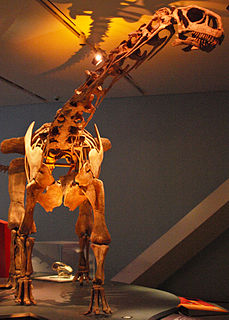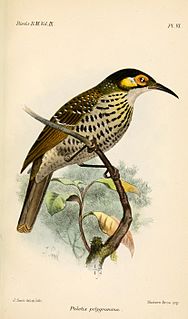
The hooded oriole is a medium-sized New World oriole. The male of this species ranges in color from a bright orange to a paler yellow, with a black back, face, tail and bib, with the wing containing two white bars. The female is more of an olive color with some yellow accents.

A field guide is a book designed to help the reader identify wildlife or other objects of natural occurrence. It is generally designed to be brought into the "field" or local area where such objects exist to help distinguish between similar objects. Field guides are often designed to help users distinguish animals and plants that may be similar in appearance but are not necessarily closely related.

Gregory Scott Paul is an American freelance researcher, author and illustrator who works in paleontology, and more recently has examined sociology and theology. He is best known for his work and research on theropod dinosaurs and his detailed illustrations, both live and skeletal. Professionally investigating and restoring dinosaurs for three decades, Paul received an on-screen credit as dinosaur specialist on Jurassic Park and Discovery Channel's When Dinosaurs Roamed America and Dinosaur Planet. He is the author and illustrator of Predatory Dinosaurs of the World (1988), The Complete Illustrated Guide to Dinosaur Skeletons (1996), Dinosaurs of the Air (2001), The Princeton Field Guide to Dinosaurs (2010), Gregory S. Paul's Dinosaur Coffee Table Book (2010), The Princeton Field Guide to Dinosaurs: 2nd Edition (2016), The Princeton Field Guide to Pterosaurs (2022), The Princeton Field Guide to Mesozoic Sea Reptiles (2022) and editor of The Scientific American Book of Dinosaurs (2000).

The white-tailed tropicbird(Phaethon lepturus) is a tropicbird. It is the smallest of three closely related seabirds of the tropical oceans and smallest member of the order Phaethontiformes. It is found in the tropical Atlantic, western Pacific and Indian Oceans. It also breeds on some Caribbean islands, and a few pairs have started nesting recently on Little Tobago, joining the red-billed tropicbird colony. In addition to the tropical Atlantic, it nests as far north as Bermuda, where it is locally called a "longtail".

Malawisaurus is an extinct genus of titanosaurian sauropod dinosaur. It is known from the Dinosaur Beds of northern Malawi, which probably date to the Aptian stage of the Early Cretaceous

Shunosaurus, meaning "shu lizard", is a genus of sauropod dinosaur from Late Jurassic (Oxfordian) beds in Sichuan Province in China, approximately 159±2 million years ago. The name derives from "Shu", an ancient name for the Sichuan province.
Leonard Joseph Victor Compagno is an international authority on shark taxonomy and the author of many scientific papers and books on the subject, best known of which is his 1984 catalogue of shark species produced for the Food and Agriculture Organization (FAO) of the United Nations. Compagno was mentioned in the credits of the 1975 film Jaws along with the National Geographic Society.

Xanthotis is a genus of birds in the honeyeater family Meliphagidae.

The spotted honeyeater is a species of bird in the family Meliphagidae.

The acuminate horseshoe bat is a species of bat in the family Rhinolophidae. It is found in Brunei, Cambodia, Indonesia, Laos, Malaysia, the Philippines, and Thailand. It lives in forests and urban areas.

Mauritia is a genus of fan palms which is native to northern South America and to the Island of Trinidad in the Caribbean. Only two species are currently accepted.

Lejops is a genus of hoverflies, closely related to the genera Helophilus, Quichuana and Mallota.

Marquand Park is a 17-acre (69,000 m2) arboretum and recreational area located in Princeton, New Jersey. It contains walking paths, a baseball field, and attractions for children such as a sandbox and a play structure.

Tambatitanis (meaning "Tamba giant", after Tamba, the name given to the northwest of Kansai, Japan is an extinct genus of titanosauriform dinosaur from the Early Cretaceous of Japan. It is known from a single type species, Tambatitanis amicitiae, which is known from the Sasayama Group. It was probably around 14 metres long and its mass was estimated at some 4 tonnes. It was a basal titanosauriform and possibly belonged to the Euhelopodidae. The holotype was collected between 2006 and 2010.
Grammoechus polygrammus is a species of beetle in the family Cerambycidae. It was described by James Thomson in 1864.
Arctosyrphus willingii, the northern longbeak, is a species of rat-tail maggot fly in the family Syrphidae.
Milesia scutellata is a species of hoverfly in the family Syrphidae.
Spilomyia foxleei is a species of syrphid fly in the family Syrphidae.

Lupulella is a genus of canine found in Africa. This genus consists of only two extant species, the black-backed jackal and the side-striped jackal.

Helophilina is a subtribe of rat-tail maggot flies in the family Syrphidae. There are about 19 genera and more than 180 described species in Helophilina.














